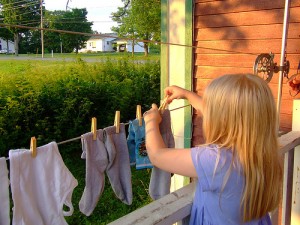Encouraging Your Children to Do Their Chores
You glance in your child’s room and it looks like a tornado swept through it. You call down the stairs to ask your son or daughter why they have not cleaned their room yet and their response is that they are busy right now and will do it later. But later does not come that day… or the next day or the next.
Chores Equals Boring

children and chores
Household chores are something that we all must do but they are not fun or exciting. Just as you do not particularly look forward to vacuuming, doing dishes or taking out the garbage neither does your child or your teenager. Playing on the computer, playing with the X-Box, watching television or hanging out with friends is so much more gratifying to them.
Your kids do not want to be taken away from something interesting that they are doing to do something that holds no level of stimulation for them at all. On some level they know that helping with chores is something that they must do as a member of the family but still knowing that does not always translate to action on their part.
Spurring Your Child to Action
The last thing you want is to feel that you are constantly nagging your kids to spur them to action only to be tuned out by them because they feel that they have something better to do with their time. Here are two things you can do to be more effective in getting your children to clean their rooms and to help out with chores around the house without driving yourself (or them) crazy:
1. Put an end to whatever your child is doing at the moment and have a talk with him or her. Find out where the problem lies and what is getting in the way of him doing his chores. Find out what else he would like to do with his day and then motivate him to get his work done so he can then get back to doing the things he loves the most. If you consider his self-interests and talk to him from that place then it will be more effective than if you talk about abstract concepts that mean more to adults such as a sense of duty and responsibility. If you do the latter then he may disconnect from the conversation right away and your points will be lost.
2. Keep time on your child when it comes to chores. You can tell your child that the dishes have to get done in in the next 30 minutes. If not then bedtime will be earlier than usual. In this way you are stating how things are going to be and you will not be in a state of constant nagging. Remind your child the next time this happens that he or she does not like having to go to bed earlier so repeating the same thing over again is not recommended. This should get your child up on his feet and give him the incentive to do his tasks because he knows that there is a cost involved if he doesn’t!
You might even want to do the reverse and tell your child that if he completes a task within the next 15 minutes then he can stay up 15 minutes longer. It is important though that the task gets done well and that he does not rush through it to get the reward of staying up 15 minutes longer. This can backfire with some kids however. Try it in your household once or twice and see how it works.
There are plenty of things that you can do to motivate your kids to do the required chores in the home. Giving your children an allowance is a good practice but it should be tied to doing jobs at home. Think of it as preparing them for the day when they will have to work for their paychecks!
Share the fun: Email + Del.icio.us + Digg + Technorati







